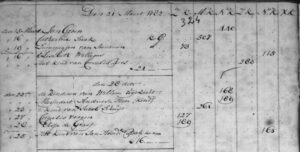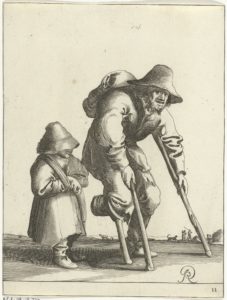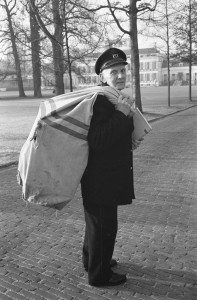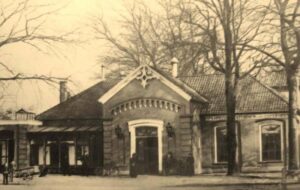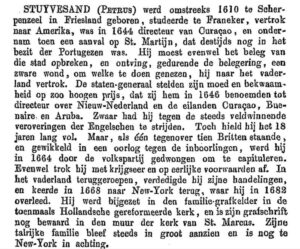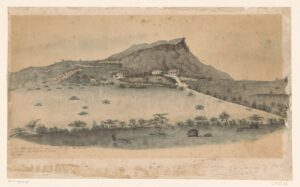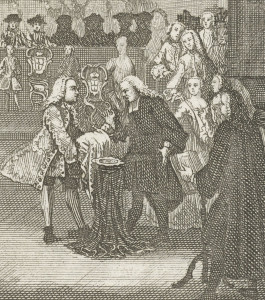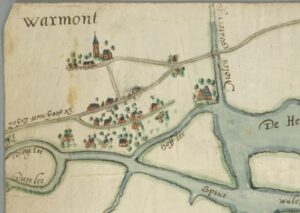A marinier is a marine. Muster rolls for marines from the period 1813-1940 can be found at the National Archives in The Hague. Some of the records were lost in World War II. The surviving records have been indexed (see "Marine"). See Finding your Maritime Ancestors for more information. … [Read more...]
Quick tip – Use Different Types of Death Records
In the period after 1811, the civil registration death records are the most reliable and informative records to use. In the period before 1811, there are different types of records that can act as substitutes for death records: Burial records kept by the churches Account books by the churches or deacons where fees are recorded for renting a pall, ringing the bells, or paying for the grave. Records of the death duties levied by civil authorities. Not all records exists in every … [Read more...]
Dutch term – Armenzorg
Armenzorg means "care for the poor." You can often find it as a topic in finding aids. See poor relief in the Netherlands in the 1600s for background information about this subject. … [Read more...]
Dutch Genealogy News for August 2020
Here are the new sources and websites that were announced last month. Sources The slave registers of Curacao (1839-1863) are now available via the Nationaal Archief website. Almost 20,000 old books were added to Delpher. This includes literary classics from the Netherlands and translations of foreign works. The town records of several places in Noord-Brabant have been scanned and are now available online. See the news announcement of the Brabants Historisch Informatie Centrum for the … [Read more...]
Case study – Using Death Duties Files to Gain Insights into the Financial Situation
While researching my third great-grandfather Teunis van Nijkerken, I discovered he owned quite a bit of capital when he died in Winterswijk on 1 June 1887. His death duties file indicated he and his wife Johanna Vonhof owned over 2,000 guilders in assets, including 500 guilders in a bank account, and about 700 guilders in money lent to others.1 By the time Johanna Vonhof died on 24 July 1889, the value of the estate had shrunk to 1,700 guilders, which included almost 600 in the bank account … [Read more...]
Quick tip – Van der Aa’s Biographical Dictionary
A biographical dictionary from the 1800s is available online: Van der Aa's Biografisch Woordenboek. The 21 volumes contain thousands of lemmas about more or less famous people in the Netherlands. The dictionary is in the public domain so you can use it for your own research. To find entries, select the first letter of the last name and then browse alphabetically. The names have links behind them that will show the corresponding imaged book in the right pane. You can click the 'transcription' … [Read more...]
Slave registers of Curacao now available online
The slave registers of Curacao (1839-1863) and the emancipation registers of Curacao (1863) are now available via the website of the National Archives of Curacao and National Archives of the Netherlands. … [Read more...]
Dutch term – Dominee
A dominee is a minister, a protestant clergyman. The word comes from the Latin dominus which means "mister" or "lord." Dominees can be found since the reformation in the 1500s. Most of the north-western parts of the Netherlands became Dutch Reformed, while many of the south-eastern parts remained Catholic. Dominees can be found in different types of protestant churches, including Dutch Reformed churches, Christian Reformed churches, Mennonite churches, Anabaptist churches, and remonstrant … [Read more...]
Using Proof by Contradiction to Focus your Research
Those who came to genealogy from a science background are likely familiar with “proof by contradiction”—a way to prove a theory by demonstrating that its opposite leads to an insupportable contradiction.[1] Many genealogists use this technique, often implicitly. Whatever the name, genealogists benefit from understanding how to apply the technique to improve research efficiency and focus. Using proof by contradiction, a three-step mathematical example proves the theory that there is no … [Read more...]

